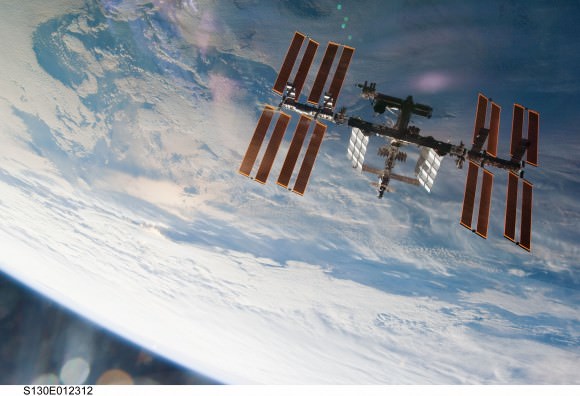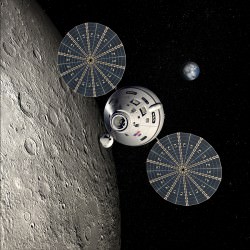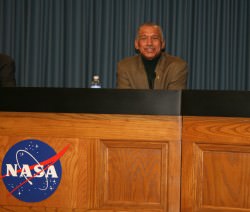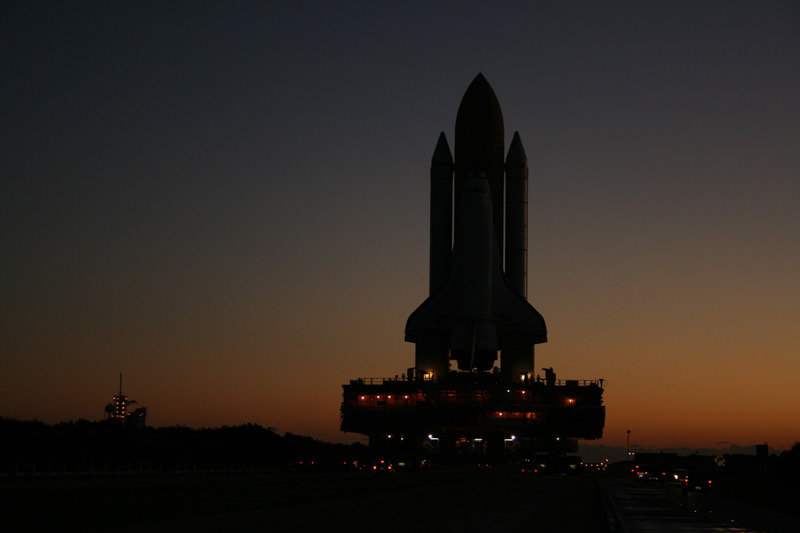[/caption]
NASA Shuttle program manager John Shannon said on Tuesday (Mar 9) that the Space Shuttle Program can indeed be safely extended beyond the existing plan to retire the fleet after completing the four missions currently remaining to fly by the end of 2010. The key issue now is money not safety.
“Where the money comes from is the ‘big question’. We feel like we’ve addressed [the issue of shuttle] recertification”, said Shannon at a press briefing at the Johnson Space Center in Houston.
More missions could be flown if money was available. But there could be up to a two year gap in flights due to the need to restart the production lines for the huge External Tank (ET) which have already been shut down. NASA has only five ET’s remaining in inventory to fly out the current manifest of four, plus 1 more flight if approved by the Obama Administration, (read my earlier article).
The purpose of any additional shuttle missions is quite clear. They would be directed to resupply the International Space Station (ISS) who’s working orbital lifetime has just been extended by five years to 2020 from 2015. However, the ISS cannot operate and conduct the scientific research for which it was constructed without a steady and robust stream of rocket launches to loft new human crews and cargo resupply flights.
“The real issue the agency and the nation has to address is the expense,” said Shannon.
“The shuttle program is fairly expensive. We burn at about a $200 million a month rate. So that gives you a base of about $2.4 billion a year that it would require to continue flying the shuttle, almost irregardless of how many flights you flew during the year. There’s just a base cost there you have to pay to keep the program in business”, explained Shannon.

Shannon’s comments are completely in line with those spoken by NASA KSC Shuttle manager Mike Moses about two weeks ago at the STS 130 post landing briefing. The vast expense which would supposedly be required to recertify the three orbiter shuttle fleet to fly beyond 2010 has frequently been cited by many shuttle detractors to justify a shuttle shutdown.
Shannon and Moses now state that NASA has in effect already recertified the shuttle fleet as part of the requirements set by the Columbia Accident Investigation Board (CAIB) for the Return to Flight in 2005 following the Columbia tragedy during re-entry in February 2003.

President Obama’s highly controversial recent decision to completely cancel Project Constellation (comprising the Orion capsule and Ares 1 and Ares V booster rockets) leaves the US with no near term human spaceflight program to replace the shuttle before its looming retirement and no vehicle to send astronauts to the ISS and beyond to the Moon and Mars as directed by President Bush in 2004.

The US would be left completely dependent on the Russians and their Soyuz capsule to send American astronauts into space for many years to come. Russia recently increased the price for Soyuz seats to $50 million and further increases are expected after the shuttle is retired.
Meanwhile, China is pushing full steam ahead developing a new heavy lift booster – the Long March 5 and is constructing new manned Shenzhou capsules and even the first element of a space station.
China puts its scientists and engineers to work generating innovations on exciting new space projects, while the US voluntarily dismantles its space exploration capabilities, lays off tens of thousands of people – potentially devastating local economies – and loses their accumulated knowledge.
President Obama has directed that NASA should cancel development of the manned Orion capsule and instead fund alternative private companies to develop new space taxis to deliver astronauts to low Earth orbit, or LEO. Critics have questioned the timelines of when the commercial companies can actually produce a manned capsule and whether the safety of astronauts will be compromised by companies seeking profits.
$9 Billion has already been spent on Project Constellation and NASA Administrator Charles Bolden says it will cost an additional $2.5 to cancel the ongoing contracts.
At least 9000 jobs will be rapidly lost at the Kennedy Space Center due to the simultaneous shutdown of the Shuttle and Constellation human spaceflight programs. Tens of thousands more jobs will be lost across the country, especially in Florida, Texas, Louisiana, Alabama and California. Layoffs have already begun.
There has been harsh bipartisan criticism of Obama’s new plan for NASA from some key members of Congress in the Senate and House who cite the new plan as nothing more than a gigantic “job killer” which will also kill Americas 50 year long leadership in Space and terminate manufacturing facilities and infrastructure as well as the accumulated know-how. Many in academia and industry also fear greatly for the future job prospects of students in science & technology, engineering and aerospace.
Senator Kay Bailey Hutchinson (R-Texas) has introduced a new bill to extend the life of the shuttle program until a replacement rocket system is available. Representatives Suzanne Kosmas (D) and Bill Posey (R) of Florida introduced similar legislation in the House of Representatives – which was co-sponsored by other Democrats and Republicans from several states – to extend the shuttle, minimize the human spaceflight gap and accelerate development of a next generation space vehicle.
“Right now we estimate that gap would be about two years from when we’re told [to restart production] to when we’d have the first external tank rolling off the assembly line”, explained Shannon. The gap could be shortened by delaying one or more of the remaining flights.
Shannon said that in response to the Congressional bills, “We kicked off an extension study for each of the program elements to go out and physically touch base with each of the vendors and the sub vendors and the entire supply chain and understand where we might have some issues if we were to restart the program.
“There is this big misconception that there’s all this big supply chain that was shuttle specific only. Shuttle is for the most part a sideline business for these major companies that support the actual program. We will send that information to NASA Headquarters.”
“We’ve addressed the orbiter recertification issues. We are addressing the supply line issues. I don’t expect to find any problems there. The real issue we would have is just in manufacturing. While you have a supply chain, while you can get a workforce back to go and build things like external tanks, there would be some type of a gap”, he added.
Basically, an extension depends on whether the money is available. President Obama decided that he would not fund a shuttle extension and also decided to terminate Project Constellation in the new NASA budget.
The White House has just announced plans for a Florida space summit on April 15 to be held at or near the Kennedy Space Center where President Obama will discuss his new strategy for NASA. He may also announce approval for one more shuttle mission using the final ET being held in reserve in case of a space emergency rescue mission for the currently planned final mission in September 2010.
Based on the very hostile reaction and comments from Congress and local residents and politicians in Florida at a number of recent forums, President Obama should not anticipate to be greeted by a friendly crowd unless he unexpectedly announces a major policy change.
Earlier Shuttle extension and Constellation articles by Ken Kremer
Orion can Launch Safely in 2013 says Lockheed
Shuttle Endeavour Rolled to Pad; Countdown to the Final Five Begins


Did he say “irregardless”?
Oh, and yes… It would be kinda nice if NASA did have some kind of vehicle to launch.. In his words (for the most part)…
What is the problem with there being a gap in HSF capability. I’m still not convinced that there is a problem.
IF the money is available? What do you mean IF? I mean, the FED just prints money out of nothing, debasing the currency for big business and political agendas.
The FED printed up and gave away 2 trillion dollars and REFUSES to say who that money went to.
Yet when it comes to a realistic goal of working on human space travel, something no doubt required for the long term – it gets pushed to the side amoungst a wave of political bantering and hollow speak.
But Christ almighty, if Goldman Sacks or AIG or GM or any of these guys have an issue crop up because of greed within the fiat system – well let’s get the printers warmed up and that funny money flying out the door to a) debase the currency and b) continue to enslave the public in the biggest ponzi scheme in the solar system.
Disgusting.
Excepting perhaps the first decade or so, the manned space program has been a waste of time, effort & money. It is not needed, but more to the point isn’t wanted. We don’t _need_ the Hubble Sapce Telescope, but almost everyone _wants_ it, because it satisfies our desire for knowledge. Exploration is not about going somewhere just to tick it off a list, people explore because they want to know what’s out there. Going into space actually diminishes this because noone is under any illusion that we could find out more about what is out there if we didn’t have a manned space program. It’s not possible to convince people that, for instance, the ISS is worth while. They just don’t buy it because they know that so very little of value is coming out of it. Proponents of manned space exploration, at this point, usually start talking about technology spinoffs, but that always feels like someone with a weak case overreaching. Name me one spinoff that people give a damn about. However, when I tell people that the universe is expanding at a rate it ought not to, they are really excited about that because it’s a romantic and very great unknown. We don’t want any more spongy mattresses or pens that can write upside down in a vacuum. We want to explore the great mysteries.
Okay now people.. squeeze your brains a little.. kick those neurons into gear and lets come up with a good financial reason to continue flying the shuttle!
How about: As ISS science discovers new materials which can only be manufactured in zero gravity, specifically foamed metals? Or pure semi-conductor seed crystals? Or a medical breakthrough(s)?
What’s that mean? WHEN new materials ARE developed, manufacturing modules will need to be added to the ISS… and those materials shipped to Earth. How will the manufacturing modules be launched?
etcetera…
The end goal for this administration was eliminating a highly visible Bush program.
What the administration ran into was a “new coke” problem. No one really loves constellation (capsules aren’t photogenic), but they know it will pan out better than most other options if given the resources. So they didn’t want to see it die.
Losing the shuttles at the same time is a double whammy.
We might need more R&D in the spaceflight business, but NASA is a smoke and fire agency. Voters expect to see something happening at any given time of day. This is a bad time to have the press covering the silence of our rockets as our only remaining manned space vehicles go into museums.
To that end, extending the shuttles so their retirement falls outside of election season is a very affordable move. Its not like politicians are spending their own money to make it happen anyway.
The shuttle construction isn’t the safest one imaginable, but IIRC some review it has the safety record of the US program measured as success rate in getting men up. The remaining reason to have it reach product cycle termination is economical.
This decision was made and acted on by the previous US administration. It was the US congress that made the replacement program unsustainable. And it was an independent commission that decided on the recommendations by the experts that it should go.
Obama is just acting out on this firmly, and he should be lauded for that.
@ Rob_Bowman:
The US manned space program has not been a waste of time, effort & money. We have a human presence in space, now on a continuous basis, much thanks to US efforts.
“How about: As ISS science discovers new materials which can only be manufactured in zero gravity, specifically foamed metals? Or pure semi-conductor seed crystals? Or a medical breakthrough(s)?
What’s that mean? WHEN new materials ARE developed, manufacturing modules will need to be added to the ISS… and those materials shipped to Earth. How will the manufacturing modules be launched?”
Atlas V. It doesn’t have to be human rated to launch modules that aren’t planned to be made, launched or even developed.
@Torbjorn “We have a human presence in space, now on a continuous basis, much thanks to US efforts”
Yes we do, thanks to some incredible engineering and great human endeavour. But that wasn’t my point at all – if that talent and money had been applied elsewhere, we’d have reaped many times over the meagre results manned spaceflight has afforded us. As we have from NASA’s Great Observatories program.
My (admittedly slightly mischevious) challenge still stands: I can talk for literally hours about the great leaps of human understanding brought about by NASA’s unmanned activities. Can anyone name ONE great result from the shuttle program or ISS?
@Rob_Bowman
“Can anyone name ONE great result from the shuttle program or ISS?”
You are joking right? You sound like a conspiraty theorist. Or a creationist with their ONE fossile that would prove it all.
There is NO ONE magic thing there are many tens of thousands small enginering things and experiences to make the ISS work.
Guidance systems, space hardned electronics and computers, life support systems, tracking technology, radio communications, materials for space suits, research in osteroporosis,… and many many thousands of things thet you zill find back in very day life without realizing it that this is the result of human space exploration.
@ Rob Bowman:
Thanks for the words of wisdom. I couldn’t agree more.
For a few percent of the Shuttle + ISS + Constellation budgets there’d be orbiters and landers and rovers and flyers on every solar system planet and main moons today.
Science was never the point with the manned projects, just a lousy excuse for the public. Remember Apollo. Only one scientist ever got to the Moon, the last 3 missions which might have been more scientific were just canceled.
Manned spaceflight was just as painfully useless then as it is today.
The reason for manned Space exploration is pretty simple. What happened to the dinosaurs? We need humans in space because we need a plan B. If the crap hits the fan on Earth (and we have a pretty damn reliable track record of that happening) the Human Race would be back to the stone age a hell of a lot faster than you think.
How long did it take Haiti to degenerate into chaos once that little island started shaking? And Indonesia? And New Orleans? Now wrap your minds around something a hell of a lot bigger. Sure it sounds like hype and propaganda or fear mongering, but are you willing to stake our entire species place in the cosmos on it?
We don’t have anyone to come to our rescue and bail us out WHEN Yellow Stone erupts, or we get smacked by a big chunk of rock from space or when some megalomaniac with a nuclear warhead and an inferiority complex decides to push the button.
Manned space flight is critical if for no other reason than to increase the tenuous grasp the human race actually has in our universe and guarantee to some degree that all we have accomplished in our short time here isn’t erased because we were too stupid to hit the save button.
Ken Kramer, with the greatest respect, why this?
Clearly John Shannon doesn’t have the pay grade or the pockets to extend the Shuttle programme. Neither does Mike Moses nor Senator KBH. Further, the numerous options for servicing the ISS remove any necessity for continually diverting so much of NASA’s budget towards the Shuttles and away from new science missions.
There will be life after the Shuttles and many of us look forward to reading about that, please.
Thank you.
The shuttle should be exstended and the constellation program brought back on line, we can’t allow Obama to cancel this, for the Russians will charge out of this fees to fly with them and in all reality, we’re the the only ones keeping their space program going as it is, their behind us in leading the ay, we don’r need to destroy our programs , we need to lead the way,
If they go with the current plan , we’ll fall farther behind than we are in th education and ciences, we need to step up, everyone shopuld write their Senators, Congresman,space exploration has given us so much and can keep giving us even more, we need to lead and not follow.
To Silver Thread. I sort of agree with your comments about a Plan B though if we’re serious about making plans for getting off here in an emergency we’ve got to put a lot of effort and money into it NOW. We also have to convince the purse-holders and public that it’s a real threat. Here in the U.K. there’s a Liberal Democrat member of parliament who has been trying to raise awareness of asteroid impact for many years – a guy called Lembit Opik. Whenever he appears on tv or radio his ideas are ridiculed and he has become a figure of fun. “Ooo, tell us Lembit, how we’re going to go the way of the dinosaurs” Cue laughter. His grandfather was the eminent Estonian astronomer Ernst Opik so he has credibility. It will be a long, hard road.
@Olaf – I’m not a conspiracy theorist or a creationist. I’m very much anti both of those things. I have an electronics degree and worked for many years in the field. I have the utmost respect for the talent and professionalism of those people who have worked on the ISS, shuttle. However, whilst their achievements were great, I wish their talents had been applied elsewhere.
As for the benefits, your list is spurious, and here’s why:
“Guidance systems, space hardned electronics and computers, tracking technology, radio communications”
……… All have been developed as a result of the unmanned space program too. A manned program is simply not necessary for those rewards.
“life support systems, materials for space suits”
………. you only need that technology if you want to send people into space, and most people don’t want to send people into space because it doesn’t give us what we actually want – which is exploration. The ISS is utterly frivolous, it’s exploring nothing.
“research in osteroporosis”
………. Absolute bunkum. The research results are really low grade. So much so that when they are announced there’s a whiff of embarrassment about it all. More to the point though, ask an osteoporosis sufferer or any scientist in the field if they want a shuttle program or $150 BILLION dollars put into medical research.
“and many many thousands of things thet you zill find back in very day life without realizing it”
……… As I said earlier, this sounds like overreaching. With that much money at stake (our money, remember), it isn’t good enough to be that vague just because space flight turns you on.
Manned space flight turns ME on – I love it. I still don’t want it at the moment, though.
A simple and uncomfortable truth is that the manufacturing base, that makes the shuttles and would have made Constellation is grossly inefficient, outdated and the real hindrance to Nasa (or any space agency) moving forward.
WHY (why) has the price of shuttle flights (NOT) fallen in all these years.??????
I’m not from the US, but I sometimes despair when I read the Comments from US citizens.
Can you really be so stupid and blind to not see your own failings in this area.??? Seriously,
Separate national prestige from the space program. That day has passed and its not coming back.
Would you willingly (compromise) the most promising change announced in the history of space exploration because it offends your sense of national superiority?
Really. ?
Tell you what Build more nukes instead if it makes you feel better, at least NASA will have some plutonium to use in cheap Intra solar missions. Like Cassini. ( more value + 100 the all your manned missions ever)
Annoyed and slightly jaded at your comments.
Damian